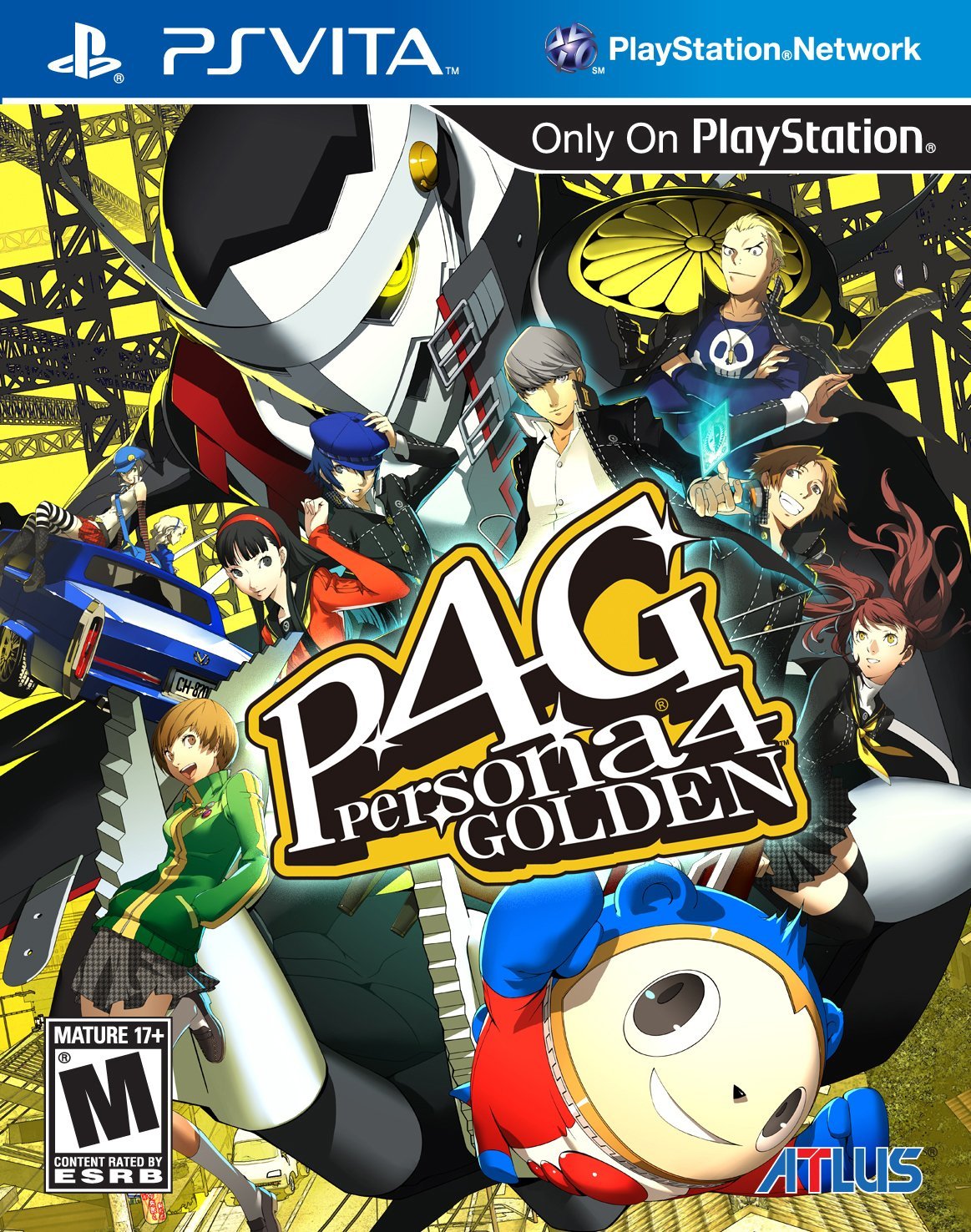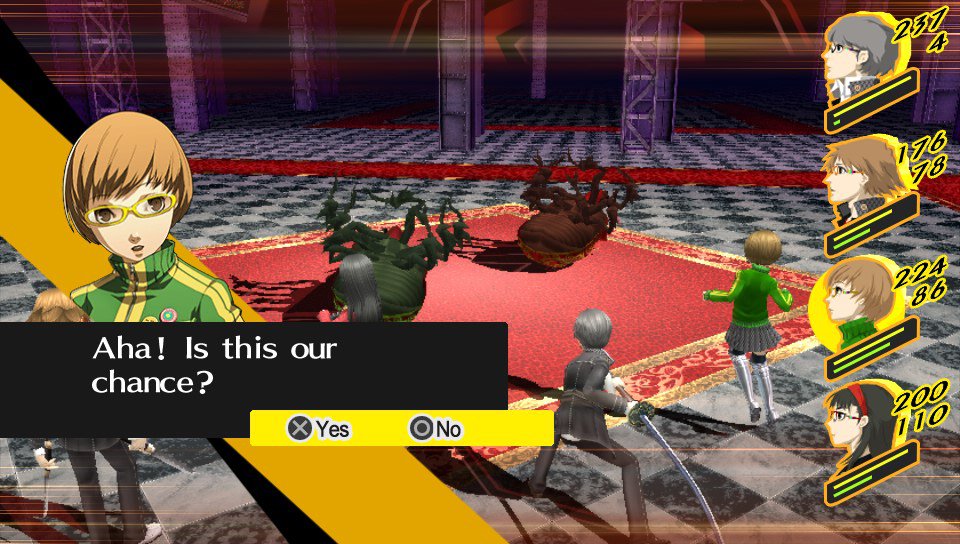 Release date: November 20th, 2012
Release date: November 20th, 2012
Developed by: Atlus
Genre: RPG/Social Simulator
Playtime: ~80 hours
Remake of... Shin Megami Tensei: Persona 4 (PlayStation 2)
Persona is a series that has slowly been gaining steam in the United States. It has been present for a long time, with the
first game in the series being localized as Revalations: Persona, all the way back on PSX. It came out in a quiet pre-Final Fantasy VII
era when the JRPG wasn't such a big part of the discussion. Localization efforts tried to scrub most of the Japanese elements resulting
in a whitewashed cast (and one...blackwashed character?) and the game received fairly average reviews. Two games later (one of which
skipped a U.S. release until many years later), the franchise went dormant until 2006 when Shin Megami Tensei: Persona 3 was released.
This wasn't a terribly timely release either since the game came out on the PlayStation 2 when everyone was looking forward to the
PlayStation 3. Even the original release of Persona 4 was on PS2...in 2008. None of these factors stopped the games from building up a
serious fan base, and the rampant hype (and incredible art and graphic design) over Persona 5 finally pushed me to look into the series.
I started off with the PSP remake of Shin Megami Tensei: Persona, played through Shin Megami Tensei: Persona 2 - Innocent Sin and then
skipped ahead to Persona 4 Golden because I snagged it in a Vita game lot on eBay for a great price. While I absolutely loved the first
two games, I was hesitant to play Golden. The early Persona games are much closer to the classic idea of a JRPG: dungeon crawling and
grinding. Starting with Persona 3, the games started implementing a social simulator aspect. The social aspects have somewhat been
mislabeled as a dating simulator, which isn't accurate. This was my understanding of what the gameplay was going to be, a mix between
dungeon crawling and dating simulator. I was surprised at what I actually found, however...
Persona 4 starts off with your character arriving in Inaba, a fictional rural Japanese town. You're a high school student who will be living with his uncle for a year. During the social simulator sections of the game you can engage in a variety of activities. You'll go to class, study, join a sports team (soccer or basketball), join an extra-curricular club (music or drama), get a part-time job, get your scooter license, go to the beach, learn to fish, try to build up the stamina to eat a massive noodle bowl, see a movie, read a book.....
You get the idea. You can do a lot of stuff in this game. However, these activities aren't just idle time wasters. By spending time with your friends and increasing your skills (knowledge, diligence, courage, expression, understanding) you'll develop social links. Social links are crucial to the completion of the game. Social links will grant your party members additional abilities, different endings, and the abilities to fuse various high level persona. Shortly after you arrive in town, you begin to learn of rumors about the Midnight Channel. The Midnight Channel appears on a turned off TV at midnight on a rainy night. You discover that this is linked to murders occurring in the Inaba area and resolve to find out what exactly the Midnight Channel is and solve the murders with your group of friends. Your characters finds out he has the ability to go inside of the TV and summon persona: persona are manifestations of the individual's personality. They are essentially the source of your magic attacks in the Persona games, however their attributes are more important than your characters' own. The user of the Persona inherits its elemental weaknesses and strengths. Persona are tied to the arcana of the tarot deck, and when creating new persona they are represented as tarot cards. Social links are also tied to arcana, with each character's social link serving to empower the various arcana.
My fears early in the game were that I would enjoy the social simulator aspects the least and would be trying to plow through them while waiting to get to the next dungeon. I found it was easier to think of the game almost as a TV show. The social links play out as ranks, going from 1-10. As you move through each rank of the social link, each character will have a personal conflict which they will wrestle with through the ranks. Once you max the social link, the person's issues will be resolved. It was incredibly rewarding to see the resolution of some of these stories (in particular, the Death, Hanged Man, Heirophant and Emperor arcana). Some of the stories told through social links aren't too rewarding (Moon, Chariot and Magician weren't my favorites), but the interactions are fairly short. Pursuing these social links will take time, in-game time. While you have many activities that you can do, you only have so much time in the day. There isn't an actual countdown timer in the game, but large activities will take time. After classes are finished you have an after school period where you can engage in any various activities. If you do something simple like buy equipment, it won't take time. If you decide to go to soccer practice and increase your social link, it will advance time to evening. Early in the game you're restricted to staying home in the evening and studying, but eventually you can use the night to go to part time jobs or spend time with friends.

You can cook, too.
There is a definite rhythm to the game and once you get into it, it is very addictive. By the end of the game I found myself enjoying the story playing out in the social simulator portion of the game much more than I did the actual dungeon crawling/gameplay portion. It got to the point where I felt annoyed at going through dungeons. While Persona 4's combat is fairly engaging.. it's incredibly simplistic. The focus of the game is on exploiting weaknesses (as any other JRPG with elemental magic), but it becomes tedious because of how focused on this aspect the game is. When you successfully hit a weakness, you get another attack and knock down the enemy. When all the enemies are knocked down, you can do a simultaneous attack with all of your party members... and that's about as deep as it gets. The combat is a seriously disappointing step down from the earlier games in the series. The original Persona game had an incredibly deep combat system that had weapon combat, guns, magic from personas and a communication system where you could talk to demons and try to negotiate with them. On top of all of that, the game featured a grid system where a character could only attack certain enemies on the board. Persona 2 did simplify this further by removing the grid system and guns but adding fusion attacks where two characters' personae could attack simultaneously resulting in a more powerful attack, but the system was still satisfying. Persona 4 is almost simple to the point of being like Pokemon. That isn't a knock, but everything about the game is set up as a fairly hardcore dungeon crawler. Indeed, that was the origin of the series as well with first person views and endless dungeons. It's something of a disconnect and it gets boring. If Persona 4 wasn't an 80 hour experience, this would be more tolerable. However, it is an 80 hour experience and it gets to be a real pain in the ass to deal with a dungeon when the story has serious momentum.

Get used to this.
It sounds like Persona 4 is a ridiculously complicated game, but it's actually very straightforward once you start playing. Even though I have complaints about the combat, most players probably won't. RPGs have been trending away from complex systems for quite some time, and going by most of the Persona fanbase (who started at 3 and 4), they largely can't stand the first three games due to how grindy and complicated the games are. It's a testament to just how good the game is and how enjoyably the story plays out that I'm saying this is probably one of the finest JRPGs to be made when I find the combat system to be simplistic. I can't recommend this game enough. The Golden version on Vita adds a new social link and new months to the calendar in addition to some other changes. Personally, I love the Vita and think it has been treated terribly by Sony. I would say it's worth either purchasing a Vita or a PlayStation TV to play this game. Barring that, I can't imagine the missing social link in the original Shin Megami Tensei: Persona 4 version of the game would really hurt things that much. This particular character that was added is fairly controversial. This is a damn fine game. If you have any interest in RPGs, I would encourage you to put aside any biases you have against anime style games and any hesitations over the social simulator aspect.
Additional Stuff
As I've gotten older, I really don't want to fuck around with getting bad endings in games and missing stuff. There's no shame in using a walkthrough or other help. The goal is to enjoy the game, and if you accidentally get yourself a bad ending after 60 hours? Not too great.
- This walkthrough helps with max social links to get the best ending.
- Fusion Calculator, to assist with creating Persona
- A useful general info site
